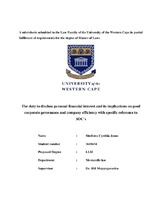| dc.contributor.advisor | Mupangavanhu, BM | |
| dc.contributor.author | Jonas, Sindiswa Cynthia | |
| dc.date.accessioned | 2021-03-29T09:10:35Z | |
| dc.date.available | 2021-03-29T09:10:35Z | |
| dc.date.issued | 2021 | |
| dc.identifier.uri | http://hdl.handle.net/11394/8070 | |
| dc.description | Magister Legum - LLM | en_US |
| dc.description.abstract | The common law duties have been preserved by the partial codification of the duties of directors in terms of the Companies Act of 2008 (‘2008 Act’). One such duty is the duty to disclose personal financial interest in terms of s 75 of the 2008 Act. The need for directors to disclose personal financial interest has become more necessary than ever before in South African companies, particularly State-Owned Companies (‘SOCs’), due to their role in the South African economy. The injury caused by the breach of this duty is not only to the company, but more harm is caused to the economy and the beneficiaries who are the recipients of services rendered by SOCs. There has been a plethora of media reports of poor corporate governance in SOCs which is attributed to conflict of interest due to failure of directors to disclose their personal financial interests in proposed transactions or approved agreements. | en_US |
| dc.language.iso | en | en_US |
| dc.publisher | University of the Western Cape | en_US |
| dc.subject | Auditor general | en_US |
| dc.subject | Conflict of interest | en_US |
| dc.subject | Constitution | en_US |
| dc.subject | Corporate governance | en_US |
| dc.subject | Eskom | en_US |
| dc.title | The duty to disclose personal financial interest and its implications on good corporate governance and company efficiency with specific reference to SOC’s | en_US |
| dc.rights.holder | University of the Western Cape | en_US |

